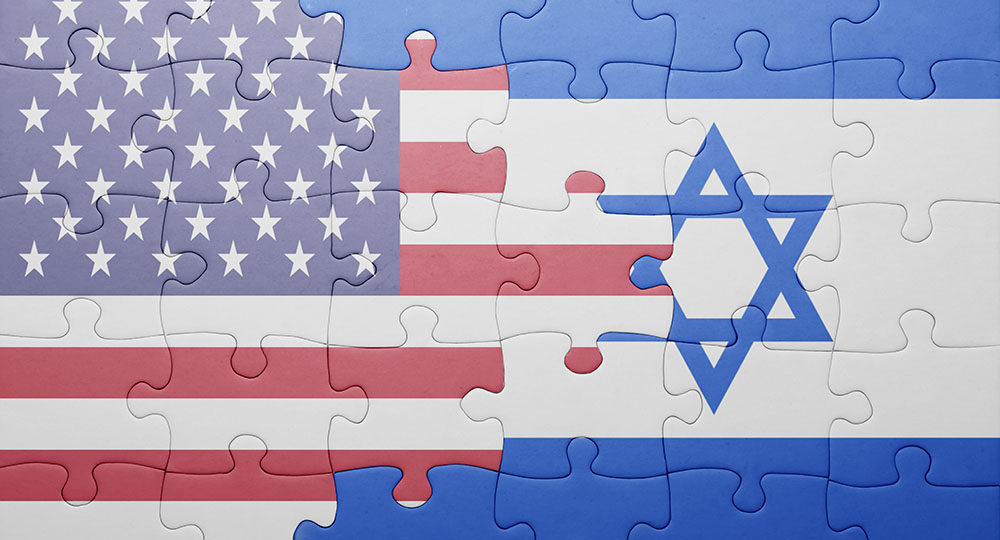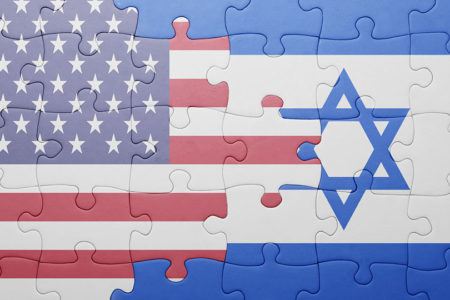Defining Our Obligation Toward Israel
It seems worth noting that America’s president has, for the third time, delayed moving the U.S. Embassy in Israel from Tel Aviv to Jerusalem. Mandated in the Jerusalem Embassy Act by an overwhelming declaration of both houses of Congress in 1995, the move was to take place no later than May 31, 1999.
However, for 13 years, at six-month intervals, every commander-in-chief has clicked the repeat key to circumvent carrying out the nearly unanimous will of the American people. Without even altering previous wording, the president informed the secretary of state, “I hereby determine that it is necessary to protect the national security interests of the United States, to suspend for a period of 6 months the limitations set forth in sections 3(b) and 7(b) of the Act.”
In adopting the Jerusalem Embassy Act of 1995, Congress acknowledged the obvious in its list of 17 findings. Among them are these:
(1) Each sovereign nation, under international law and custom, may designate its own capital.
(15) The United States maintains its embassy in the functioning capital of every country except in the case of our democratic friend and strategic ally, the State of Israel.1
The fact that Israel has the only capital in the world America refuses to recognize not only impugns our national integrity but telegraphs a suspicion that somehow the Jewish state is illegitimate. In fact, two perceptions of America emerge with every delay to transfer our embassy:
- Weakness. U.S. national security is not an issue here. Actually, it would enhance our position to step up to the plate and act, rather than capitulate, which satisfies no one except Israel’s enemies. America’s reluctance implies its enemies have the upper hand in their quest to denigrate the legitimacy of a united, Jewish Jerusalem.
- Disloyalty. It looks like we’re betraying the one true ally we can always count on and that we acquiesce to carving Jerusalem once again into a two-state tangle, despite “congressional sentiment that Jerusalem must remain an undivided city.”2
Jerusalem was divided for 19 years, and Jewish people had no access to their holy sites. When Israel won the Six-Day War in 1967, it removed the barbed-wire enclaves created by armistice lines after the 1948 War of Independence. To re-establish those barriers, although in another fashion, would perpetuate the increasingly prevailing opinion that Western solutions only make matters worse.
Is this any way to treat a friend? If the embassy were the only such issue, it might be considered merely a lamentable distraction. But Israel is constantly put on the defensive. It is treated like a pocket of pestilence that disrupts the region’s tranquility and burdens the West with its stubborn insistence on survival and reasonable territorial dimensions.
Grace Gestures
On June 7, 1967, in response to Lt. Gen. Mordechai (Motta) Gur’s dramatic announcement, “The Temple Mount is in our hands,” Israeli paratroopers gathered at the Western Wall to celebrate the return of Jerusalem to its rightful heirs. Rabbi Shlomo Goren sounded the ram’s horn, signifying the city’s reunification and calling for all Jews to come home at long last. On that momentous day, Israeli Gen. Moshe Dayan expressed the sentiments of virtually the entire Jewish world and its friends:
We have returned to the holiest of our Holy Places, never to part from it again. To our Arab neighbours we extend, also at this hour—and with added emphasis at this hour—our hand in peace. And to our Christian and Muslim fellow citizens, we solemnly promise full religious freedom and rights. We did not come to Jerusalem for the sake of other peoples’ Holy Places, and not to interfere with the adherents of other faiths, but in order to safeguard its entirety, and to live there together with others, in unity.3
In the words of another, “To Israelis and Jews all over the world, this was a joyous and momentous occasion. Many considered it a gift from God.”
Israel has kept Dayan’s promise. In perhaps one of the greatest good-faith gestures in history, Israel placed the holiest of holy shrines, the Temple Mount itself, in Muslim control. Its generosity was rewarded with a Muslim edict prohibiting Jewish people from praying there, followed later by the preposterous claim that there never was a historic Jewish presence or Temple on the Mount.
It seems ironic that, while the Jewish state has scrupulously allowed all religions free access to their places of worship—including Islam—Jews cannot, without dire consequences, pray at their holiest place. They must content themselves with praying at the Herodian retaining wall supporting the Temple platform. Furthermore, Islamists blatantly proclaim that, when they finally conquer all of what they deem to be Arab Palestine, they will expel the Jews altogether or intimidate them into fleeing, as has been the situation in the Gaza Strip, Bethlehem, and other Islamic-controlled areas.
Harbingers of the Future
What does this portend for the future?Nothing good for the Jewish state, particularly when the buzz words from the West to Israel are no, stop, don’t, concede, wait, and give more to the Palestinians with no expectation of reciprocity.
This analysis is not difficult to defend. The world has opposed every legitimate construction plan Israel has had in Jerusalem and the West Bank. Plus there is an apparent diplomatic paralysis in dealing with Iran’s mania to destroy Israel, as well as unrealistic appraisals of the anti-Israel, anti-Western “Arab spring” that masquerades temporarily as democracy.
To worry about irreparably damaging Israel’s partners for peace and the two-state solution is beyond fantasy. Face it: Israel does not have a partner for peace—certainly not in the Palestinian Authority, Hamas, or other Islamic organizations sworn to its demise. How many times do these groups have to tell us their ultimate goal is to buy time (while bleeding the West of economic aid) on the way to an all-Arab, one-state solution called Palestine?
In the 1950s, a young Jewish pop singer, Kitty Kallen, scored a vocal triumph with the song “Little Things Mean a Lot.” The sentiment of the title often holds true. Don’t be fooled by the grandiose pomp and ceremony associated with publicity-grabbing peace-talk summits that vaunt great promises and greater expectations. If you’re looking for the real action, explore the little things done beyond the glare of TV lights. If you’re paying attention, you’ll discover the truth.
Palestinian Media Watch (PMW) reports that a Palestinian song denying Israel’s existence was performed for Palestinian Authority (PA) Chairman Mahmoud Abbas and a group of Palestinian dignitaries in 2011. The lyrics call all of Israel “my land” and promise to stand behind the PA chairman until all Israel can be “liberated.” Over the next several months, the song was aired 27 times over official PA TV.
An op-ed published in the official PA daily, Al-Hayat Al-Jadida, on the May 15 anniversary of the founding of the State of Israel demonized the event as “the greatest theft in history…the most criminal act that humanity has ever seen…[the establishment of a] fascist state upon the ruins of the Palestinian people, which has suffered the greatest and ugliest ethnic cleansing known in modern history.”4
Never mind that the PA unashamedly uses its textbooks to teach children to hate Israel, glorifies suicide-bombing terrorists as shahids (martyrs), and plans to rid its future State of Palestine of Jews. PMW cites a chilling call to action by PA secretary general of Abbas’s office, Tayeb Abd Al-Rahim: “Oh brothers [Martyrs], your souls now hover above us and say to us: ‘Follow in our path.’”5
Whistling in the Dark
To continue to ignore the evidence or insist this hubristic flame-throwing is simply political rhetoric is unacceptable. Cooling the narrative or buying off the belligerents will not alter the situation. These people are saying precisely what they mean and should be taken at their word. It’s as simple as that.
To cave in or vacillate is to court catastrophe. Strength, solidarity, moral integrity, and determination are the options our enemies will understand. I say our enemies because Israel’s enemies are ours as well. Praying for the peace of Jerusalem is a mandate from God, and putting feet to those prayers is an obligation.
ENDNOTES
- “S. 1322 (104th): Jerusalem Embassy Act of 1995” <govtrack.us/congress/bills/104/s1322/text>.
- Ibid.
- “Statement at the Western Wall by Defence Minister Dayan,” June 7, 1967, Israel Ministry of Foreign Affairs <tinyurl.com/DayanSaid>.
- Itamar Marcus and Nan Jacques Zilberdik, “PA daily op-ed expresses hope for Israel’s destruction,” Palestinian Media Watch, May 24, 2012 <palwatch.org/main.aspx?fi=157&doc_id=6896>.
- “Terrorist martyrs tell us to follow in their path, says PA official at funeral for terrorists,” Palestinian Media Watch, May 31, 2012 <palwatch.org/main. aspx?fi=111&doc_id=6925>.







